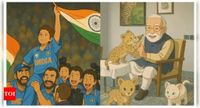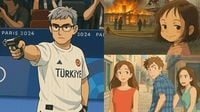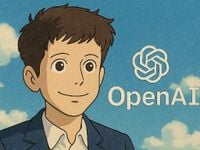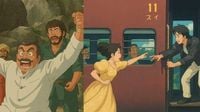Digital privacy activists are raising alarm bells over OpenAI’s latest Ghibli-style AI art generator, which has gone viral among users eager to transform their personal images into enchanting, animated portraits reminiscent of Studio Ghibli films. Critics argue that this trend may be a clever ploy for OpenAI to gain access to thousands of personal images, potentially compromising user privacy.
Since the launch of this feature, users have found themselves unwittingly handing over fresh and unique facial data to OpenAI, a concern that has sparked heated discussions on social media platforms like X. Activists assert that this data collection strategy is more than just a copyright issue; it allows OpenAI to acquire voluntarily submitted images, effectively bypassing legal restrictions that apply to web-scraped data.
Under GDPR regulations, OpenAI must justify scraping images from the internet under “legitimate interest,” which requires additional safeguards. However, when users upload images themselves, they provide consent, granting OpenAI greater freedom to process the data without the same legal constraints.
OpenAI’s ability to access new, unique photos, including personal and family images that may never have been publicly available online, has raised significant concerns. Unlike social media companies, which may only see the AI-generated “Ghiblified” versions, OpenAI retains the original uploads. This retention raises questions: what happens to these images once they are submitted?
Activists warn that once users submit their photos, they lose control over how those images are used. OpenAI’s privacy policy states that user inputs may be used for model training unless they opt out, leaving many uncertain about the long-term implications of their participation.
Several risks have been highlighted by critics, including potential data breaches, where personal images could be leaked in the event of a security breach; AI misuse, where uploaded faces might be used to generate misleading or defamatory content; and commercial exploitation, where user images could be repurposed for personalized ads or sold to third parties.
Despite these concerns, some argue that the controversy is overblown, likening the Ghibli effect to common filters on platforms like TikTok and Snapchat. Unlike traditional AI-generated art, which creates entirely new images, OpenAI’s tool applies a stylized filter to existing photos—similar to other digital effects users already accept. However, privacy advocates counter that the key difference lies in OpenAI’s ability to store and train on these images, rather than merely altering them for temporary use.
As excitement around AI-generated avatars continues, privacy activists urge users to be cautious. They suggest that the thrill of creating Ghibli-style portraits is leading people to trade their privacy for entertainment, often without fully understanding the implications.
Meanwhile, the trend has sparked a wave of animated creativity across the internet. Platforms like xAI’s Grok chatbot, which also offers similar features, are struggling to meet demand and are now imposing paywalls on previously free tools. Users on Grok have encountered usage limit errors and subscription prompts, while those visiting the standalone Grok AI website or app can still access the image generation feature freely.
OpenAI CEO Sam Altman acknowledged the viral Ghibli trend, stating it was “melting” GPUs due to the massive computing load involved in mass image rendering. The excitement surrounding this feature has led to unprecedented demand, causing strain on OpenAI’s infrastructure. Altman has urged users to “chill out a bit,” as the overwhelming response has overloaded the servers.
The introduction of native image generation in GPT-4o has empowered users on ChatGPT AI platforms to create intricate visuals. Thousands have already shared their stylized portraits online, many paying homage to iconic films like Spirited Away, Princess Mononoke, and Howl’s Moving Castle.
While the ChatGPT Ghibli art generator continues to dominate the AI art scene, the accessibility issues with Grok AI website tools may push users to seek more reliable, open solutions. OpenAI’s decision to embed powerful image tools within the ChatGPT AI ecosystem has clearly resonated with users, while xAI’s limitations may hinder the full creative potential of its user base.
The Ghibli-style portraits have become a cultural phenomenon, captivating not just animation fans but also the general public. The simplicity of the tool has made it widely accessible, enabling people from all walks of life to participate in the “Ghiblification” craze. This blend of technology, art, and nostalgia has turned Ghibli-style AI portraits into a viral sensation across social media platforms.
As this trend evolves, it brings with it a host of ethical concerns regarding copyright infringement and the future livelihood of human artists. An intellectual property rights lawyer noted that while “style” is not explicitly protected by copyright, the legalities surrounding AI-generated art remain murky. OpenAI has stated it does not replicate the style of individual living artists but permits the replication of broader studio styles.
With the rapid advancement of AI technologies, the debate over data ownership and ethical AI use is likely to intensify. Users are encouraged to remain informed and cautious as they navigate this new landscape of digital creativity.








